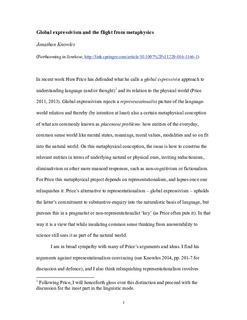Global expressivism and the flight from metaphysics
Journal article, Peer reviewed
Accepted version
Permanent lenke
http://hdl.handle.net/11250/2468535Utgivelsesdato
2016Metadata
Vis full innførselSamlinger
Sammendrag
In recent work Huw Price has defended what he calls a global expressivist approach to understanding language (and/or thought) and its relation to the physical world. Global expressivism rejects a representationalist picture of the language-world relation and thereby, by intention at least, also a certain metaphysical conception of what are commonly known as placement problems: how entities of the everyday, common sense world like mental states, meanings, moral values, modalities and so on fit into the natural world. Global expressivism upholds a commitment to substantive enquiry into the naturalistic basis of thought about the world, but pursues this in a pragmatist or non-representationalist ’key’ (as Price often puts it), thereby rendering—as it sees things—traditional metaphysical questions otiose. I am in broad sympathy with many of Price’s arguments and ideas. However, I believe the specific sub-variety of non-representationalism he develops actually fails to secure the anti-metaphysical results he seeks. My arguments have their starting point in the Carnap-Quine debate. Given Price’s view of this, which I endorse, I think it can be made clear that Quine’s view, or something very close to it, presents us with a coherent example of a non-representationalist metaphysical placement project. Though one might reasonably doubt the rationality of or motivation for such a view, Price’s own strongly naturalistic assumptions, as these are evinced in his so-called ’subject’ naturalism, make that move dialectically unavailable to him. I end with a brief sketch of an alternative non-representationalist and anti-metaphysical position.
